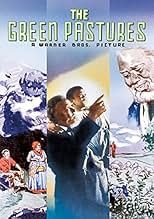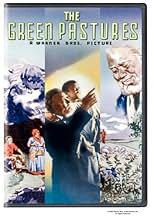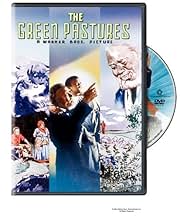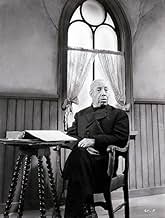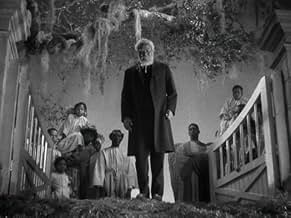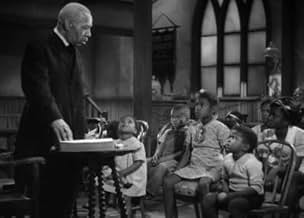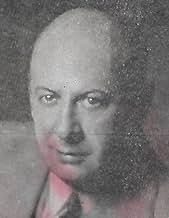AVALIAÇÃO DA IMDb
7,0/10
973
SUA AVALIAÇÃO
Adicionar um enredo no seu idiomaGod, heaven, and several Old Testament stories, including the Creation and Noah's Ark, are described supposedly using the perspective of rural, black Americans.God, heaven, and several Old Testament stories, including the Creation and Noah's Ark, are described supposedly using the perspective of rural, black Americans.God, heaven, and several Old Testament stories, including the Creation and Noah's Ark, are described supposedly using the perspective of rural, black Americans.
- Direção
- Roteiristas
- Artistas
- Prêmios
- 4 vitórias no total
Eddie 'Rochester' Anderson
- Noah
- (as Eddie Anderson)
Frank H. Wilson
- Moses
- (as Frank Wilson)
Edna Mae Harris
- Zeba
- (as Edna M. Harris)
Charles Andrews
- Flatfoot
- (as Chas. Andrews)
Billy Cumby
- Abraham
- (as William Cumby)
- …
- Direção
- Roteiristas
- Elenco e equipe completos
- Produção, bilheteria e muito mais no IMDbPro
Avaliações em destaque
"The Green Pastures" is a far from perfect film and I am pretty sure quite a few folks would be offended by the picture. In fact, the DVD begins with a written disclaimer that explains that the content is offensive when seen today. Obviously, times have changed and the film's patronizing style is out of style in the 21st century--but it's also a film you should see as there really isn't anything like it--even MGM's "Cabin in the Sky". And, in some ways, it's rather beautiful.
The film features an all-black cast--something very unusual for a production from a major studio. It consists of young black children listening to Bible stories and shows the kids' conception of what these events must have been like. The stories are seldom literal--and are quite different from the Biblical originals (such as having only one plague instead of the ten from the story of Moses). But there is also a certain beauty in the stories that show a literal physical God interacting with angels and people on Earth. Sure, it's NOT something that seminary professors would heartily endorse, but the film isn't meant to be literal.
As I said above, the stories are all done with a black cast--even Rex Ingram as God (called 'Da Lawd'). And, although patronizing in style and possessing a few awful stereotypes (such as folks shooting dice), the film is also gentle and good-natured and I assume the film was NOT intended to harm anyone. In other words, the manner is not one to put down black America but perhaps unintentionally minimizes them by often portraying them with a certain child-like innocence. You just have to see it to know what I mean.
So how did this film manage to still get an 8. After all, it surely has a lot of problems! Well, the artistry is the reason. Along with some very nice acting, the film has terrific sets, nice direction and is just lovely. See this one.
The film features an all-black cast--something very unusual for a production from a major studio. It consists of young black children listening to Bible stories and shows the kids' conception of what these events must have been like. The stories are seldom literal--and are quite different from the Biblical originals (such as having only one plague instead of the ten from the story of Moses). But there is also a certain beauty in the stories that show a literal physical God interacting with angels and people on Earth. Sure, it's NOT something that seminary professors would heartily endorse, but the film isn't meant to be literal.
As I said above, the stories are all done with a black cast--even Rex Ingram as God (called 'Da Lawd'). And, although patronizing in style and possessing a few awful stereotypes (such as folks shooting dice), the film is also gentle and good-natured and I assume the film was NOT intended to harm anyone. In other words, the manner is not one to put down black America but perhaps unintentionally minimizes them by often portraying them with a certain child-like innocence. You just have to see it to know what I mean.
So how did this film manage to still get an 8. After all, it surely has a lot of problems! Well, the artistry is the reason. Along with some very nice acting, the film has terrific sets, nice direction and is just lovely. See this one.
The origins of The Green Pastures are from the anthology of stories published by writer Roarke Bradford who entitled his volume Ol Man Adam An' His Chillun. Written in 1928 it was adapted into a play by Algonquin Round Table member Marc Connelly and for an incredible 640 performances during the height of the Depression. In 1936 Warner Brothers purchased the rights and did this film version of the play utilizing a whole load of black players in the film colony.
The Green Pastures got two revivals on Broadway, but you don't hear of it being revived in the post Civil Rights era. It hasn't had the staying power at all of Porgy and Bess which had similar origins.
The story is told from the eyes of a child in a rural black church's Sunday school who is hearing the story of Genesis and imagining what the people would be like in her mind. De Lawd is played by Rex Ingram and this would become two of his career roles, the other being the genie in The Thief Of Bagdad. Personally I can imagine him being God far better than George Burns.
The characters of the Bible are for these people invested with a lot of human qualities, more like the Greek and Roman deities of antiquity than the traditional white Christian view. My favorite scene is the one where the only good man in a world awash with sin is that preacher Noah played by Eddie Anderson. When Ingram visits him and tells him he's starting over and to build an ark and take male and female of everything for breeding, Anderson starts haggling with De Lawd over the amount of spirits to be taken on this sea voyage for medicinal purposes only you understand.
Of course the Ark does its 40 days and 40 nights thing and then just sails around until some land starts to emerge. Personally back in those days polygamy was in and I never understood why Noah and the boys didn't have some extra wives along. The task before them might have been fun, populating the earth again, but it sure put a strain on their wives.
A film like The Green Pastures has a childlike innocence about it, it would have to in order to succeed on stage and screen. It's not likely to see any revivals due to changing times and sensitivities. But it remains an entertaining if quaint vehicle today.
The Green Pastures got two revivals on Broadway, but you don't hear of it being revived in the post Civil Rights era. It hasn't had the staying power at all of Porgy and Bess which had similar origins.
The story is told from the eyes of a child in a rural black church's Sunday school who is hearing the story of Genesis and imagining what the people would be like in her mind. De Lawd is played by Rex Ingram and this would become two of his career roles, the other being the genie in The Thief Of Bagdad. Personally I can imagine him being God far better than George Burns.
The characters of the Bible are for these people invested with a lot of human qualities, more like the Greek and Roman deities of antiquity than the traditional white Christian view. My favorite scene is the one where the only good man in a world awash with sin is that preacher Noah played by Eddie Anderson. When Ingram visits him and tells him he's starting over and to build an ark and take male and female of everything for breeding, Anderson starts haggling with De Lawd over the amount of spirits to be taken on this sea voyage for medicinal purposes only you understand.
Of course the Ark does its 40 days and 40 nights thing and then just sails around until some land starts to emerge. Personally back in those days polygamy was in and I never understood why Noah and the boys didn't have some extra wives along. The task before them might have been fun, populating the earth again, but it sure put a strain on their wives.
A film like The Green Pastures has a childlike innocence about it, it would have to in order to succeed on stage and screen. It's not likely to see any revivals due to changing times and sensitivities. But it remains an entertaining if quaint vehicle today.
10Greg-83
I first saw "The Green Pastures" quite by accident as a 13 year-old while visiting grandparents in Detroit, Michigan many, many years ago...I never forgot it.
Years later, in college, while on a date, I was telling my date about it and we stopped by the school library so I could find a copy of the play to show her...she loved it, too. I've since bought the tape and watch it every now-and-then when I want to smile and feel good.
I remember asking my mom about the movie when I first saw it and always remembered her response..."how do you think the little black children in the movie pictured God and others in the Bible?" And that, of course, is exactly what Marc Connelly was trying to get us to think about.
Though the original play/movie may have met resistance in the South, it was a hit in New York. To the eternal historical revisionists of today who see nothing but stereotypes and negative images, I'd suggest you take another look.
Country folk of the early part of this century did talk with accents and few had much education (whites as well as blacks). The dialog of the film is less a contrived stereotype than it is a snapshot of what the simple life was like. It's not hard for me to imagine a dedicated Mr. Deshee teaching kids in Sunday School about the good book. Nor is it hard to understand why they might picture pharoe's guards in double-breasted suits like the gangsters in the news of their youth, or relating any number of other scenes to what was familiar to them.
Connelly was not trying to convert viewers to religion...he was trying to get those already converted to see the personal relationship with God enjoyed by all his children, regardless of their station in life.
There are no whites in the movie, just as there were no whites in the immediate community where the story takes place. This movie was not made with the burden of every social dilemma we've struggled with over the years. To blindly force modern perceptions and racial baggage on it does nothing but dampen the simple joy of this unique gem.
Years later, in college, while on a date, I was telling my date about it and we stopped by the school library so I could find a copy of the play to show her...she loved it, too. I've since bought the tape and watch it every now-and-then when I want to smile and feel good.
I remember asking my mom about the movie when I first saw it and always remembered her response..."how do you think the little black children in the movie pictured God and others in the Bible?" And that, of course, is exactly what Marc Connelly was trying to get us to think about.
Though the original play/movie may have met resistance in the South, it was a hit in New York. To the eternal historical revisionists of today who see nothing but stereotypes and negative images, I'd suggest you take another look.
Country folk of the early part of this century did talk with accents and few had much education (whites as well as blacks). The dialog of the film is less a contrived stereotype than it is a snapshot of what the simple life was like. It's not hard for me to imagine a dedicated Mr. Deshee teaching kids in Sunday School about the good book. Nor is it hard to understand why they might picture pharoe's guards in double-breasted suits like the gangsters in the news of their youth, or relating any number of other scenes to what was familiar to them.
Connelly was not trying to convert viewers to religion...he was trying to get those already converted to see the personal relationship with God enjoyed by all his children, regardless of their station in life.
There are no whites in the movie, just as there were no whites in the immediate community where the story takes place. This movie was not made with the burden of every social dilemma we've struggled with over the years. To blindly force modern perceptions and racial baggage on it does nothing but dampen the simple joy of this unique gem.
I've never seen a movie like this. It's probably one of the most interesting Biblical movies I've ever seen. I'm black and I didn't think it was too offensive, considering the time period that it came from. In fact, my whole family liked it. This is one movie you really have to give a chance before you watch it. Unfortunatelly, movies like this and Disney's "Song of The South" are thrown among the wayside so they won't "corrupt" our "politically correct" society.
When you pop either THE GREEN PASTURES or HALLELUJAH in your DVD player, Warner Brothers' disclaimer comes up, stating these films "are a product of their time.... it does not express Warner Brothers' opinion....." Okay, they're setting the record straight. They want to present two excellent movies, without offending anyone. The "warning" is eclipsed by two factors. These two films, both with all black casts, showcase amazing talent often smothered by the then Hollywood studio system. They also both carry a message of faith told in a very entertaining manner.
THE GREEN PASTURES opens with a Sunday School sermon in the deep south. The classroom is made up of attentive black children asking some pretty intelligent questions about the Bible. We peek into one child's view of heaven. Since this child probably knows very little of the world outside her community, heaven is one big fish-fry with plenty to eat, where the adults get to hangout and smoke ten-cent "see-gars".
It's here where God (referred to in the film as "De Lawd") makes an appearance. This is an Oscar worthy performance by Rex Ingram, one of many black actors at the time who seldom received decent film work from Hollywood. Ingram plays "De Lawd" in a sweet, soft-spoken manner, never talking down to the humans he created. "Now you're just doing fine," he tells Adam. "But there's just one thing missing. You need a family." Ingram's quiet tone always tells us this guy has things in order. Film fans may remember Rex Ingram as Jim in HUCKLEBERRY FINN (1939) and as the laughing, constantly sarcastic genie in THE THIEF OF BAGDAD (1940). Not only was Ingram an accomplished stage actor, but he was a certified MD as well!
Ingram also plays Adam and Hezdrel. During the later performance, GREEN PASTURES most memorable time-tested message comes across very simply. We realize this is truly a cinematic classic. The Bible stories are depicted here in pseudo 20th century settings with old world behavior. (Much like the villages in the first three FRANKENSTEIN films) Moses is a modern-day "trickster" who gives Pharaoh's top magician a run for his money. In another scene, a pistol packing gangster in a double breasted suit mouths off to Noah.
THE GREEN PASTURES opens with a Sunday School sermon in the deep south. The classroom is made up of attentive black children asking some pretty intelligent questions about the Bible. We peek into one child's view of heaven. Since this child probably knows very little of the world outside her community, heaven is one big fish-fry with plenty to eat, where the adults get to hangout and smoke ten-cent "see-gars".
It's here where God (referred to in the film as "De Lawd") makes an appearance. This is an Oscar worthy performance by Rex Ingram, one of many black actors at the time who seldom received decent film work from Hollywood. Ingram plays "De Lawd" in a sweet, soft-spoken manner, never talking down to the humans he created. "Now you're just doing fine," he tells Adam. "But there's just one thing missing. You need a family." Ingram's quiet tone always tells us this guy has things in order. Film fans may remember Rex Ingram as Jim in HUCKLEBERRY FINN (1939) and as the laughing, constantly sarcastic genie in THE THIEF OF BAGDAD (1940). Not only was Ingram an accomplished stage actor, but he was a certified MD as well!
Ingram also plays Adam and Hezdrel. During the later performance, GREEN PASTURES most memorable time-tested message comes across very simply. We realize this is truly a cinematic classic. The Bible stories are depicted here in pseudo 20th century settings with old world behavior. (Much like the villages in the first three FRANKENSTEIN films) Moses is a modern-day "trickster" who gives Pharaoh's top magician a run for his money. In another scene, a pistol packing gangster in a double breasted suit mouths off to Noah.
Você sabia?
- CuriosidadesThe studio's anxiety about this film's all-Black cast is evident in the film's 3:48 minute trailer. It consists of white actor Dick Powell talking directly to the camera, white workers preparing costumes and props, and author Marc Connelly explaining the rationale for the bare sets to a studio executive. According to Connelly, it is how a "simple, devout" people would imagine heaven. At no time are Rex Ingram or any of the film's other stars shown in the preview, and there is only a brief sequence of black extras in a long shot.
- Erros de gravaçãoOne of Noah's son's rides a zebra that is clearly a donkey or mule made to look like a zebra. Two real zebras are loaded while he rides the fake.
- Cenas durante ou pós-créditosGod appears in many forms to those who believe in Him. Thousands of Negroes in the Deep South visualize God and Heaven in terms of people and things they know in their everyday life. The Green Pastures is an attempt to portray that humble, reverent conception.
- ConexõesEdited into Governing Body (2023)
- Trilhas sonorasHave You Got Good Religion (Certainly, Lord)
(uncredited)
Traditional spiritual
Performed by the Hall Johnson Choir
Principais escolhas
Faça login para avaliar e ver a lista de recomendações personalizadas
- How long is The Green Pastures?Fornecido pela Alexa
Detalhes
- Data de lançamento
- País de origem
- Idioma
- Também conhecido como
- The Green Pastures
- Locações de filme
- Empresa de produção
- Consulte mais créditos da empresa na IMDbPro
- Tempo de duração1 hora 33 minutos
- Cor
- Mixagem de som
- Proporção
- 1.37 : 1
Contribua para esta página
Sugerir uma alteração ou adicionar conteúdo ausente


